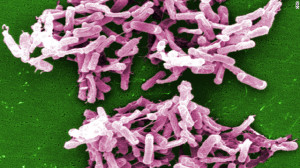 Clostridium difficile
Clostridium difficile
C. diff bacteria are found in the intestines. Healthy people who have enough “good” bacteria in their intestines may not get sick from a C. diff infection. But for people with weak immune systems, the germ can cause a number of symptoms, such as diarrhea or life-threatening inflammation of the colon.
People who take antibiotics are at greater risk of C. diff infection, because antibiotics can kill the good germs in the intestines, leaving an imbalance. Those most at risk are the elderly who take antibiotics, and also patients who get regular hospital or nursing home care.
C. difficile is linked to an annual 14,500 American deaths from gastroenteritis, or “stomach flu”. The number more than doubled between 1999 and 2007, according to new research from the Centers for Disease Control and Prevention. C. diff accounted for two-thirds of all gastroenteritis deaths over the study period.

